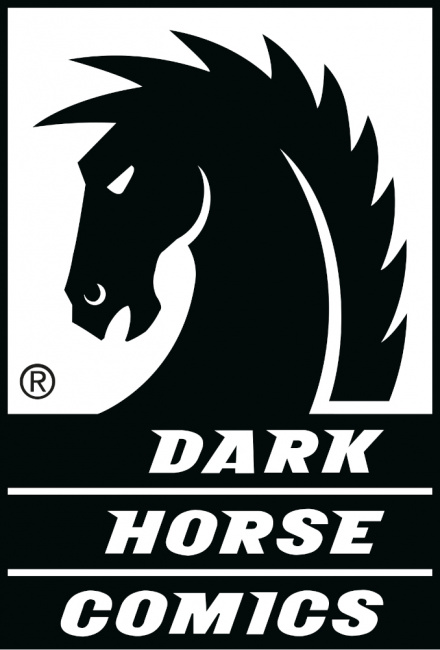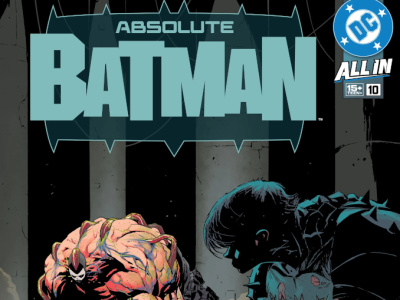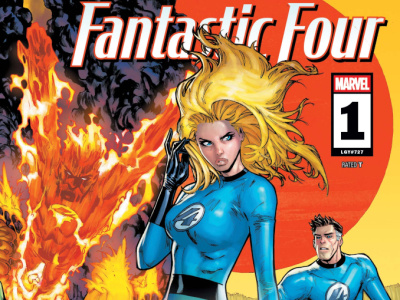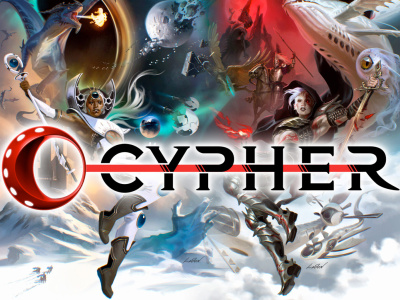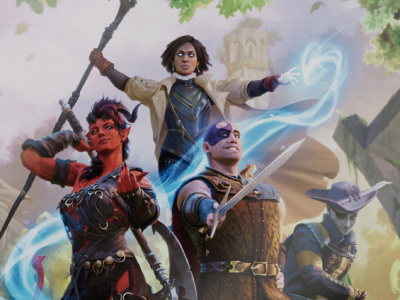We caught up with Dark Horse Comics CEO Mike Richardson for our first interview since the company was acquired by Embracer Group, and heard from him via email on the market for comics, graphic novels, and manga, and why periodical comics may have outlived their usefulness, his reasoning in moving distribution from Diamond Comic Distributors to Penguin Random House, Dark Horse’s increasing use of creator imprints, future projects with other Embracer companies, and the entertainment pipeline.
ICv2: Your visibility to the comic and graphic novel market is pretty unique because you see it from both the retail and publishing view. What’s your assessment of the state of the market for (separately) periodical comics and graphic novels – how are sales in those two categories looking in 2022 vs. 2021 (or 2019)?
Mike Richardson: Comic sales are doing well, though they may have lagged a bit during the second quarter compared to last year at this time. We’re expecting a modest Christmas season, but who knows, if the economy shows signs of bouncing back, that could change.
Comic books have increasing challenges as our industry continues relying on a format that may have outlived its time. Comics originated as a cheap way to republish the funny pages. They were printed on newsprint, loaded with story pages, sold for a dime, and could be found everywhere. Very accessible for a kid with change in his pocket and few places to spend it. Now comics are printed on quality paper, have as few as 20 pages of story, and prices of $3.99, $4.99, $5.99 and up. Most kids choose other options, and now, the readership consists mainly of those 20 years and older. Comic books used to be everywhere but now are hard to find outside of the comic shops that need them to bring customers through the door each week. I used to supplement my comic orders with a visit to the local ID. Those days are gone. For the two major comics companies, now owned by movie studios, comic books are a small side-business when compared to the income generated by films.
On the other hand, graphic novels, whether original or collections, keep gaining strength in traditional bookstores, which is the exact opposite of the ‘80s when I opened my first store. This makes sense since an older reader would most likely want a complete book, rather than chapters of a story released 20 pages at a time monthly over four to twelve months. There’s also something to be said about a book on a shelf as opposed to a comic in a box somewhere. Of course, that logic does not apply to collectors, who still exist, though in smaller numbers.
Any differences by channel?
Huge difference for Dark Horse. 85% of our sales are found in traditional bookstores. We’ve been told by PRH (Penguin Random House) that we consistently outsell Marvel and DC in bookstores and its bookstores that have pushed Dark Horse sales over nine figures. This is one of the reasons I despise the often-quoted Diamond publisher market numbers. Last I checked, we had sold almost five million copies of Berserk. Yes, that’s what I said, and we have a number of books that have sold seven figures. None of them are included in the Diamond market share because we don’t distribute our books through Diamond.
What are you expecting from the print market for the holidays and 2023?
Good to modest sales for the holiday season. The economy is lagging but we have some very strong sellers to pull us through.
You’ve been in manga forever, and now that market’s been blowing up – how is your business changing in this new, much larger manga market?
As you mention, we’ve been publishing manga for a very long time. I’m not sure if you are aware, but we actually had our own offices and publishing arm in Tokyo through a partnership with JVC’s Victor Books. I’ve been interested in Japanese comics long before Dark Horse. As a result, I was publishing manga from our earliest days. Over that time we’ve seen the market blow up before in the early to mid-nineties and in the early 2000s. We are always ready and willing to expand the line. We have a plan to repackage some past favorites as well as announce a number of new titles.
Beyond the growth of manga, what trends is Dark Horse seeing in publishing that you expect to drive future business?
We’ve seen a tremendous growth in backlist sales, primarily in the book market. This trend really accelerated during the pandemic and has continued to grow since then. As I mentioned, the vast majority of our sales are in bookstores. I think its common knowledge that comic shops, maybe even the majority of comic shops, focus on Marvel and DC, and the rest of the comics retailers split up what’s left of their budgets on the rest of us. That means a lot of our books don’t get ordered in many of the shops. Not so in the bookstores with Penguin Random House, where we regularly outsell Marvel and DC.
A year ago, you said you were watching what was going on with Diamond but weren’t contemplating any changes to distribution at that time (see "ICv2 Interview: Dark Horse CEO Mike Richardson"). Dark Horse recently announced that it would be switching its new comic distribution to Penguin Random House Publisher Services in 2023 (see "Dark Horse Signs with PRHPS"). What went into that decision?
Steve Geppi is a long-time friend of mine. We both started out behind the counters of comic shops, which I think gave us a deeper understanding of the market and the people who buy comics. We’ve been with Diamond for decades and they were instrumental in our growth.
There came a time when it made sense to move our book distribution over to Penguin Random House. That move increased our distribution by 30% in the first month. We put over 100 titles back into print several months later that had previously faded. PRH has been a great partner and helped us hit the nine-figure mark as a company.
This brings up a long-time sore subject, that being the Diamond pie chart, which for years showed us as sitting fourth or fifth in sales. I’ve seen those percentages often repeated in the press. Dark Horse is the third largest comics company in the U.S. I think by a long shot now. 85% of our sales are in the book market, and were not included in the Diamond reporting because they were reporting Diamond sales only.
With the success we’ve had with PRH distributing our books, and their move into comics distribution, it was probably inevitable that we would eventually move our comics to them. We are hoping to see the same benefits from this move. I have to say it was a hard decision made easier when they decided to move us back in the catalogue.
What do you see as the future of distribution to comic stores, and of Diamond?
I want to be clear about the fact that Diamond will continue to distribute Dark Horse publications into the Direct Sales Market as they have in the past. They will simply be purchasing them from Penguin Random House.
With regard to Diamond, I’m sure they will still be around into the future. The comics industry is projected to grow and I think competition will force them and everyone else to sharpen their game. That’s good for retailers. When retailers have choice, distributors and publishers have to listen.
A year ago, we were talking about supply chain problems in getting comics and graphic novels produced and shipped. How has that situation changed over the past year – where are we now?
Things have gotten much better, if not where they were before the COVID lockdowns. The cost of containers, which I think rose from around $4,000 per container to about $25,000, have come down to around $6,000 per.
The containers which were sitting off the coast of Southern California waiting to be unloaded are arriving, which creates a whole new problem. Much of the product ordered months ago is now arriving on top of current orders, creating issues for our warehouse staff who need to get new orders out and overdue orders shipped.
Dark Horse went through a change in ownership this year, and at the time there was discussion of synergies between Dark Horse and other Embracer companies. Can we expect to see comics based on Embracer games [in addition to its video game companies, Embracer also owns Asmodee Group – ed.], and games based on Dark Horse comics, and if so, when?
I can’t say when, but I can tell you both Dark Horse and Embracer have rich and deep libraries, something recognized by both sides when we entered into the agreement. Of course, we’re all one company now and we’ve already begun the process of sitting with the different operating groups and discussing how we can take advantage of the relationship. I imagine you’ll be seeing some announcements in the near future.
Is Dark Horse Entertainment going to be involved with media exploitation of Embracer game properties?
That’s one of our goals. We have long-standing relationships with the studios, agencies, and talent in the film industry, and we hope to bring those relationships into play with the amazing content that exists inside Embracer. We think Dark Horse can be the linchpin in expanding Embracer’s footprint in entertainment.
In publishing, Dark Horse has been making more use of creator-driven imprints, with new imprints with Eric Powell, Stan Sakai, Kevin Smith, and Matt Kindt announced just this year. What’s your reasoning behind this strategy, and how do you expect it to affect your business?
Obviously, there are a number of reliable creators who are "brands" in the comics industry. I’m speaking of creators who have clearly made a mark in comics and built followings. If those people are interested in enhancing their visibility by creating an imprint, that’s fine with me.
Both Eric and Stan had long tenures with Dark Horse before moving to other publishers and have created iconic characters. I made sure to let them know they would always be welcome here. We were lucky enough to see them return and bring their imprints with them. Matt has been publishing with us since his early days and is one of the key creators we publish. His imprint, like the others, identifies his line of books and makes them that much easier to locate in a crowded comic shop. Kevin is an empire and brings his imprint with him. Years ago, I had the chance to get into a publishing deal with him and blew that opportunity. I’m so happy that I was able to rectify that mistake.
What are the most exciting projects you’ve got coming up in publishing, and entertainment?
So many exciting projects in both areas. New creator-owned books, new licensed properties to announce for publishing. Unfortunately, I can’t talk about the not-yet-announced projects or Cara O’Neil, who leads our marketing and PR departments, will send me to the corner.
I can talk about a few of the entertainment projects that are known, such as the third season of Resident Alien on SyFy, or the fourth season of The Umbrella Academy and Stan Sakai’s Usagi Yojimbo-inspired animated series on Netflix.
I’m also lucky enough to be working on a passion project with friend and mentor Larry Gordon, 56-time Emmy winner Ross Greenburg (yes, that’s correct), and Peabody Award-winning director Sam Pollard, on the definitive documentary on the extraordinary life and career of basketball’s greatest legend, Bill Russell. Bill worked with us on the doc until his passing, and he and his wife Jeannine have been friends of mine for a long time, so you can imagine how important this project is to me, and to the entire team.
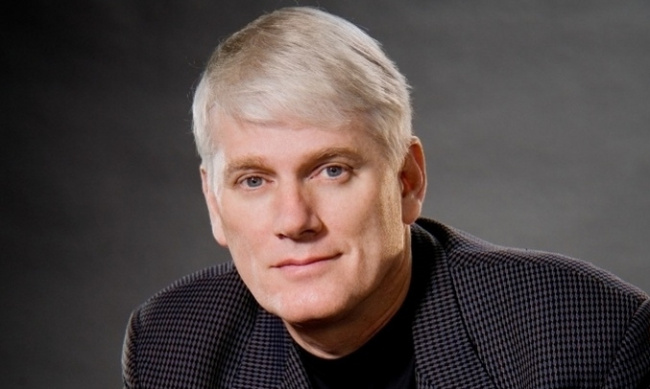
The Market and Why Periodical Comics May Have Outlived Their Usefulness, the Distribution Move, Creator Imprints, and Future Projects
Posted by Milton Griepp on November 10, 2022 @ 4:05 am CT
MORE COMICS
Sales Rankings Based on Comic Store POS Data
August 5, 2025
These are unit and dollar sales rankings based on sales tracked at point-of-sale by the ComicHub system at stores selling American comics around the world.
Sales Rankings Based on Comic Store POS Data
August 5, 2025
These are unit and dollar sales rankings based on sales tracked at point-of-sale by the ComicHub system at stores selling American comics around the world.
MORE NEWS
Coming from Monte Cook Games
August 5, 2025
Monte Cook Games has announced a new edition of its flagship RPG Cypher.
'Heroes of Faerun' and 'Adventures in Faerun'
August 5, 2025
Wizards of the Coast unveiled two Dungeons & Dragons: Forgotten Realms books.



